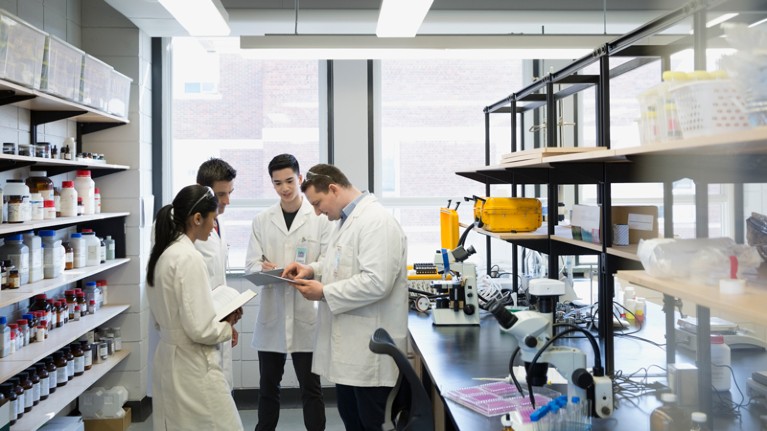
A special issue of Nature this week examines lab culture and finds improvements are needed.Credit: Hero Images/Getty
Directing academics has been compared to herding cats, animals that famously follow their own path and scorn instruction. So, while worrying, it’s perhaps not surprising that two-thirds of lab heads who responded to a Nature survey this year said that they had received no training in mentoring or managing people. Yet two-thirds of these untrained senior scientists said they thought it would be useful.
They were right. Good-quality training is a key ingredient to building a successful research group. So, too, is the wider academic environment in which researchers work. If a department or institution does not encourage collaboration, celebrate success or value solid work over flashy promotion — as well as training — then group leaders will struggle to create a healthy research culture in their own laboratories.
How institutions can help lab groups to be productive, supportive and rigorous is an essential but often-overlooked topic. To try to change that, this week we have made it the focus of a special issue. This builds on discussions between Nature editors, senior academics and postdocs held throughout 2017, and on a day-long conference co-sponsored by Nature and the University of California, Berkeley, in October 2017.
Laboratory members should feel that they are an integral part of their institutions and departments, but this is not always the case. According to the survey, one-fifth of those scientists who didn’t lead research groups had a negative view of the culture or working environment in their lab. And the barrage of sexual-harassment allegations at universities around the world is sad evidence of how often institutions fail to protect junior members of communities.
Institutional support is essential during the daily grind of scientific research, not just in times of crisis. In the survey, research-group leaders were asked about ways departments could support them. The most common answers pointed to resources for administrative tasks, support for mentoring and managing lab members, and more use of measures of scientific productivity beyond counts of high-profile papers.
Some hard numbers on science’s leadership problems
Institutions need to support lab members as well as leaders. A Comment piece argues that institutions should implement a ‘culture of structure’ to give graduate students clear expectations of their progress, and to ensure contact with multiple faculty members.
But each department and institution has different needs, so how can leaders work out what support to offer and make sure it is welcome? As another Comment piece advocates, they can collect benchmarking data on lab culture (such as student–supervisor relationships) to identify areas for improvement. They can also hold cross-lab meetings and ask faculty for explicit feedback in annual reports.
Some institutions have already taken the step of hiring staff to support community-building and rigorous research, such as scientists who help lab groups to implement quality-control practices. In a third Comment article, we highlight how one institute created a dedicated science sustainability officer.
Examples of such innovations to boost lab health can be hard to identify. Nature hopes to detail more as part of continued coverage — please send examples to nature@nature.com.
Others in the research enterprise also have a part to play. Funders must stress the obligation on those who receive money to support and protect trainees. Journals can set clear requirements on how work should be reported, for example, to make sure that all authors are properly credited.
But institutions are in the strongest position to improve lab health — and that can be a delicate process when introducing important reforms to independent-minded researchers. Mandated steps will not produce real improvements if academics are not persuaded of the case for them. As anyone forced to sit through generic online training programs can attest, it’s too easy to follow the letter of such laws without buying into their spirit.
More than edicts, making change requires many small discussions between stakeholders to air problems, and to build consensus and understanding. It also requires sustained commitment.
But academic institutions must start measuring and striving to improve the health of their labs. It is in their own long-term interest to do so. A small survey of North American postdocs found that a pleasant lab environment correlated significantly with life satisfaction, whereas their number of publications did not (go.nature.com/2rfjz6v). Departments that gain a reputation for better cultures will attract better scientists, because they frequently value the quality of colleagues and interaction more than funds and laboratory space. And, ultimately, that leads to more of the advances and discoveries on which the world turns. We at Nature hope that this special issue helps to stimulate a race to the top.


 Nature special: Lab health
Nature special: Lab health
 Give every paper a read for reproducibility
Give every paper a read for reproducibility
 Some hard numbers on science’s leadership problems
Some hard numbers on science’s leadership problems
 Nine pitfalls of research misconduct
Nine pitfalls of research misconduct
 Go beyond bias training
Go beyond bias training
 Health tips for research groups
Health tips for research groups
 How lab heads can learn to lead
How lab heads can learn to lead




